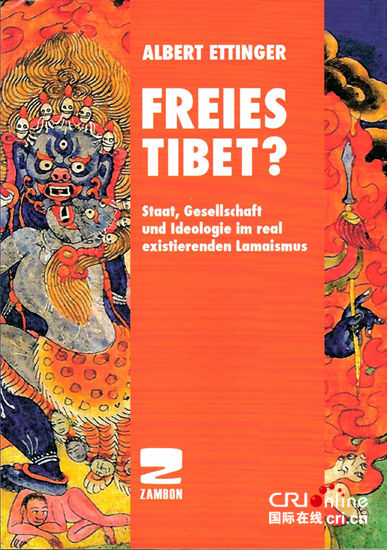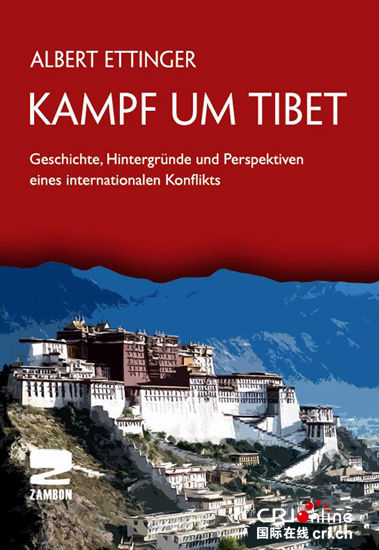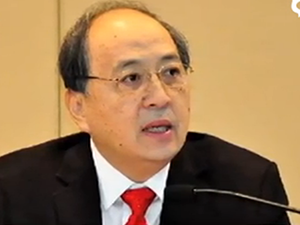 卢森堡学者艾廷格
卢森堡学者艾廷格
 《自由西藏?还原喇嘛教统治下的国家、社会和意识形态》
《自由西藏?还原喇嘛教统治下的国家、社会和意识形态》
 《围绕西藏的斗争—国际冲突的历史、背景和前景》
《围绕西藏的斗争—国际冲突的历史、背景和前景》
国际在线消息:据《环球时报》报道,《德国ZAMBON出版社去年10月和今年3月分别出版了卢森堡籍学者阿尔贝特·艾廷格撰写的《自由西藏?——还原喇嘛教统治下的国家、社会和意识形态》和《围绕西藏的斗争——国际冲突的历史、背景和前景》两部研究性著作,揭示了旧西藏的落后、十四世达赖的真实面目、“藏独”势力的所作所为,并点破了西方有关西藏的种种谎言。两本著作在欧洲多国产生反响。艾廷格6月21日在接受《环球时报》专访时表示:“我的书籍通过各种信息旨在向读者展示一个真实的西藏。那些把西藏从中国分裂出去的想法都是白日梦。”
写这两本书是因为我是教师
环球时报:您是学历史专业的,从什么时候开始关注“新旧西藏对比”和“国际社会围绕西藏的斗争”这两个学术问题的?什么原因让您决定写这两本书?
艾廷格:这两本书都不是我在大学历史研究的学术环境下撰写的。在德国特里尔大学,我的研究领域还有德国文学史。之后,我回到卢森堡进行中学和大学的教学工作。几年前,我发现德国一本关于西藏的书,可以说该书彻头彻尾地在为达赖喇嘛宣传。对此我非常愤慨,达赖喇嘛和他的追随者正试图毒害我们十多岁的中小学生,并妖魔化中国。
我撰写这两本书更深的动机,是因为我的教师职业。我一直认为,一个教师最重要的任务是教育青少年独立的、批判性的思维及寻求事实真相。这包含有关的不合理的信念和教义,以及对所谓智者和圣人持怀疑态度。
环球时报:您去过西藏吗?您对现在的西藏有哪些认识?
艾廷格:我到过中国多次,最近一次是去年。但中国的最西部,很遗憾只到过成都。我对中国的认识,当然不只来自这些旅行。旧西藏,人们无法再次体验。而作为一名不会说藏语和汉语的旅游者,洞察今天的西藏也有一定难度。所以,我宁愿自觉地深入学习和研究各种西藏的论著和报道。首先,研究一些曾在旧西藏长期生活的外国人的亲身经历和感受,来探究当时的文化和社会背景。这些人包括日本僧人川口氏、俄罗斯佛教徒齐比科夫,美国人麦戈文、英国人沃德尔或法国人大卫-尼尔。其次,对于西藏自治区和其他藏区的现状,我主要通过真正熟识的中国专家获得。同时,一些到过西藏的朋友也给我很多积极信息,如中国政府新建了许多乡村学校,用大棚种植蔬菜等。
环球时报:在研究文献和历史图片时,您有什么发现?
艾廷格:实际上,关于现代西藏和西藏的历史,西方有大量研究文献,不过对于受众来说,大多数属于未知领域。我认为这是我的职责,把这些以前只限于学术文献的重要成果传达给读者。比如,日本僧人川口氏的著作《旅藏三年记》等。历史图片更能展示旧时西藏的社会现实。我从德国联邦档案馆找到1000多张当时西藏的照片。这些照片是德国探险家1938年和1939年在西藏拍摄的。许多照片刚好过了版权期限。关于今日西藏的照片,主要来自西方游客。一些图片则来自中国的期刊《中国西藏》。在许多图片中都呈现了藏文,说明西藏在藏文的推动上并没有受到限制。
“西藏神话”与虚假的浪漫
环球时报:德国、卢森堡等主流图书销售渠道,都可以订购这两本书,几乎所有购买者都给予“五颗星”的最高评价。在亚马逊网站,有读者评论说,“这是一本富有启发的书:告诉你不知道的西藏!”“毁灭了一个神话”等。两部著作发表后,您听到学术圈有哪些议论?
艾廷格:我的书的确获得读者一致、积极的评价。同样,我有关西藏的学术演讲,在莱比锡书展等活动中也受到欢迎。许多学者告诉我,我的西藏主题研究非常必要。因为在欧洲,一些被认可的所谓“西藏研究者”不少是“西藏流亡政府”和对达赖几乎不加批判的支持者。这些“专业人士”故意忽视西藏政治、社会和法治的进步。事实上,这些进步一直不是他们感兴趣的,即使他们知道也很少发表真实的看法。2002年,两名法国“藏学家”出版一本书,来对抗中国出的《西藏百题问答》,但他们的研究来源多是出自神话和达赖的圈子。
令人高兴的是,西方也有例外。他们大部分是来自欧洲大学外围的西藏研究者。比如,有比利时的亚洲学研究者撰写的有关藏传佛教史,以及德国学者科林·高尔德纳有关达赖喇嘛的书。此外,不少汉学家对中国问题也有独特见解。
环球时报:这两本书图文并茂,读者通过图片对比,就能看到新旧西藏天翻地覆的变化。同时,这些学术著作也告诉西方读者,西藏是中国神圣领土不可分割的一部分,而且中国把西藏治理得很好。您的书,让更多欧洲人看穿了“藏独”分子的哪些谎言?
艾廷格:我不知道从哪里开始谈起。“藏独”分子有关西藏的谎言涉及旧西藏和新西藏的各个方面,包括社会背景、生活状况、宗教、个别历史事件等。可以说“西藏流亡政府”从一开始就借着那些在西方已经存在的“西藏神话”,使它们变成自己的。
这些谎言来自达赖喇嘛或他的核心圈子,比如以下这些谎言:旧西藏的藏族人民比较幸福和和平地生活;他们既不需要军队,也不需要警察;中国在1951年以武力吞并西藏;为和平解放签署的“十七条协议”是伪造的,西藏代表是被迫签署的;达赖喇嘛从西藏出逃是因为会被绑架或杀害;无论是他还是他的兄弟既没有获得美国的钱,也没有得到帮助;“西藏抵抗”是和平的,没有暴力的;中国想消灭西藏的文化和语言;中国要灭掉“藏民族”,目标是“种族灭绝”;“西藏流亡政府”唯一目的是“真正的自治”,等等。有些人还声称,达赖本人在20世纪50年代曾希望对西藏进行改革,但被“中国人”阻止。我在我的书中,公开了西方西藏研究学者的这些谎言。
环球时报:西方一些人对西藏问题的片面看法是如何形成的?达赖集团分裂国家的做法,为什么能蛊惑一些西方人?西方媒体对西藏问题过去缺少反思,甚至纵容一些分裂分子的暴力行动。
艾廷格:这里面有几个原因:其一是“西藏神话”很长时间在西方都是一种流行文化。20世纪50年代末和60年代初,西方国家就出版有漫画《丁丁历险记——丁丁在西藏》和小说《第三只眼》等关于西藏的畅销书籍。它们与流亡海外的达赖喇嘛相呼应。与此同时,好莱坞也早已跳上西藏这趟列车,拍摄了诸如《达赖的一生》、《西藏七年》、《小活佛》等电影,让人们对旧西藏形成虚假浪漫的印象。
另一个原因,即美国的“软实力”。美国政府控制了“西藏流亡政府”的谎言网络。这张网络上还有西方媒体、许多非政府组织,包括美国政府资助的国家民主基金会。不过,谎言终究有被识破的时候。20多年前,加拿大藏学家谭·戈伦夫教授出版《现代西藏的诞生》,客观论述西藏的近现代史。但该著作却遭到不少美国记者的“围攻”。
还有一个重要原因,即西方媒体对中国这一经济崛起的大国充满恐惧。德国海因里希·伯尔基金会2010年公布的一份研究报告认为,“大量的媒体报道充满陈词滥调,歪曲中国的形象”。例如将中国贬为“流氓国家的支持者”“气候变化罪人”“资源饥饿国家”等。
现在,通过中国政府积极的对外宣传,以及西方的一些学者、亲身到过中国的西方人的努力,西方媒体相对来说报道中国更加全面一些。
有人想让中国解体
环球时报:达赖喇嘛是一些西方国家对抗中国的棋子吗?
艾廷格:毫无疑问,从达赖喇嘛逃离西藏就开始了。现在可以知道,西藏分裂分子早在1950年就与美国当局有接触。美国中央情报局与达赖手拉手。达赖的哥哥也为有美国中央情报局背景的“自由亚洲”电台服务,鼓吹“西藏独立”。上世纪50年代,达赖喇嘛曾写文章流露出对新中国的支持,表明自己的“爱国情怀”。一些历史学家甚至认为,这段时间体现了他“诚实的信念”。现在回想起来,他当时这么做只是打着合作旗号,实为欺骗之术。这也让人看到达赖是政府的敌人、永恒阴谋家、机会主义者、伪君子和骗子。今天的达赖喇嘛,借助“西藏流亡政府”和接二连三的行动在西方损害中国的声誉,同时希望通过美国来削弱中国的政治经济地位。
环球时报:“围绕西藏的斗争”将如何持续?西方一些国家前两年曾猛打“藏独牌”对付中国,为什么最近这样的做法看上去没有过去那么明显了?
艾廷格:我在书中提到,“西藏流亡政府”及其在美国的支持者,他们的目标并不是所谓“真正自治”。在他们的圈子里,流传着所谓的“大藏区”地图,把旁边的(新疆)标为“东土耳其斯坦”,地图中有“满洲国”,还把内蒙古标注为单独一个国家,都成了与“共产党中国”分离的领土。很容易就能看出,这意味着有人想让中国像前南斯拉夫和前苏联一样解体。当然,这些都是白日梦。西藏从中国分裂是不可想象的。只有政治冒险家、不负责任的空想家或疯子渴望这样。在一个中国的治理下,西藏正在迅速发展。西藏的未来在于中央政府大规模地支持推进当地的经济和社会发展。随着社会物质条件不断提高,海内外藏民的认识也会不断发生变化。对此,我有信心。
环球时报:会不会有人借达赖喇嘛7月庆祝80岁生日之机在国际上掀起新一轮的“藏独”宣传?
艾廷格:这些反中国的宣传一直没有停止过,“庆生”时甚至会变本加厉。我刚写了一封信给卢森堡最大的日报,警告达赖喇嘛的生日会被重复利用,比如,有人会再次炒作“西藏语言和文化受压迫”等谎言。
我认为,中国政府应比以往任何时候更重视加强对外宣传。比如,俄罗斯在乌克兰危机期间受西方舆论猛烈攻击,但通过“今日俄罗斯”电视台,他们获得了不小的成功。(文章来源:《环球时报》作者:《环球时报》驻德国特约记者青木)
Luxembourg scholar explodes myths about Tibet independence
Editor's Note:
Germany-based Zambon press has published two books from Luxembourg scholar Albert Ettinger about Tibet - Free Tibet? State, society, and ideology in the real existing Lamaism in September 2014 and Fight for Tibet: history, background and perspectives on an international conflict in March, which have been well received in countries like Germany and Switzerland. In an exclusive interview with the Global Times (GT) on Sunday, Ettinger said his books aim to show readers the real Tibet.
GT: As a history major, when did you begin to study the comparison of new and old Tibet, as well as the "fight for Tibet" by the international community? Why did you decide to write the two books?
Ettinger: I noticed a book on Tibet in Germany a few years ago, which was sheer propaganda about the Dalai Lama. I was angry to see the Dalai Lama and his disciples trying to poison the minds of youngsters and demonize China。
My underlying motivation for writing the two books is my profession as a teacher. I have always believed that the foremost task of a teacher is to help students develop independent and critical thinking skills, and probe into the truth, including suspicion of unreasonable doctrines, so-called sages and saints。
GT: Numerous pictures that compare drastic changes in Tibet are used to illustrate the two books. What lies of Tibetan separatists have been exposed through your book?
Ettinger: I didn't know where to start. Those lies involve every aspect of new and old Tibet - social and living conditions, the religion and certain historical events. Those stories have different sources, so the Tibetan government-in-exile internalized the myths that already prevailed in Europe。
Those lies were made up by the Dalai Lama and his henchmen. For example, ethnic Tibetans existed as an independent group since 127 BC; Tibetans used to live happily and peacefully; they did not need an army or police; China annexed Tibet by military force in 1951; the agreement between the central government and the local government of Tibet for the peaceful liberation of Tibet was forged in 1951; the Dalai Lama fled from Tibet to avoid his pending abduction or murder; neither he nor his brothers were funded by the US; "Tibetan resistance" is non-violent; China attempted to make the Tibetan culture and language perish; China wanted to exterminate the Tibetan people; the sole goal of the Tibetan government-in-exile is to achieve "real autonomy."
My books also cited some subtle lies made up by Western Tibet researchers, who claimed that the Dalai Lama was stopped by "Chinese" from reforming the Tibetan society in the 1950s, or considered him a great reformer。
GT: In your opinion, how did some Westerners form a narrow view on Tibet? How can the separatist actions of the Dalai Lama group appeal to some Westerners? Western media lack self-examination on their coverage on Tibet issues, and even encouraged the violent actions of some separatists. What's the situation now?
Ettinger: There are a few reasons. First, Tibetan myths have been popular in Western culture for a long time. As early as the 1950s and 60s, Western countries published the cartoon Tintin in Tibet (The Adventures of Tintin), the novel The Third Eye and other popular books. These echo the Dalai Lama's exile。
At the same time, Hollywood has hopped on the Tibet train. It made movies like Kundun, Seven Years in Tibet and Little Buddha。
Another reason is US "soft power." The US government controls a net of lies about the Tibetan government-in-exile. This net not only includes mainstream Western media, but also many NGOs, and the new Democracy Foundation, which is funded by the US government。
But all lies will eventually be exposed. More than 20 years ago, Canadian Tibetologist Professor Tom Grunfeld wrote a book, The Making of Modern Tibet, which objectively discussed Tibet's modern history. But this book came under attack by quite a few American journalists。
Another important reason is that Western media are terrified of China, a powerful nation on the economic rise. A 2010 report from the Heinrich B?ll Stiftung China Foundation pointed out that many media reports are full of clichés that twist China's image, such as saying China "supports hooligan countries," is "the criminal behind climate change," it is a "low producer" and unscrupulously "resource-hungry."
Now, through the active publicity of the Chinese government, as well as efforts by Western tourists who have been in China and Western scholars, the reports from Western media about China are relatively becoming more comprehensive。
GT: Is the Dalai Lama a pawn which the US and other Western countries use to confront China?
Ettinger: Without question. It started when he fled Tibet。
Now we know that the separatists in Tibet have been in touch with the US government since the 1950s. The CIA and the Dalai Lama have always held hands. His brother, especially his oldest brother Thubten Jigme Norbu, was recruited by the CIA's "Radio Free Asia." Gyalo Dondrub was recruited as CIA's anti-Communism terrorist。
In the 1950s, the Dalai Lama expressed his "support" for China in many articles, demonstrating his "patriotism." Some historians even thought that was from the heart。
But in retrospect, I think that was his strategy, deceit in the name of cooperation。
Today, Dalai uses the "government-in-exile" and a lasting fight over Tibet to damage China's reputation, and hopes to use the US to weaken China's political and economic status in the world。
GT: What are the prospects for the "fight for Tibet?" Some countries in the West used to play the card of Tibet indepenence with great enthusiasm but now it appears they are not as blatant as before. Why?
Ettinger: I mentioned in my book that the exile government and its supporters in the US are not after "real autonomy." Within their circles, they consider "Greater Tibet," "East Turkestan," "Manchuria," Inner Mongolia and Communist China separate states. That means some people dream of China breaking into pieces like Yugoslavia and the Soviet Union。
Of course they're daydreaming. It's hard to imagine that Tibet would be separated from China. Only political adventurers, irresponsible daydreamers and lunatics would think that way. Tibet is prospering within a united China. The future of Tibet is riding on support from the central government to improve its economic and social development. The opinions of Tibetans overseas will change as social and economic conditions improve. I'm very confident about that。
GT: The Dalai Lama will turn 80 in July. Will they jump at the opportunity to launch a new round of campaign to promote "Tibetan independence?" How should the Chinese government respond?
Ettinger: Propaganda against China has never ceased, and it will gain momentum at this moment。
I just wrote to the biggest daily newspaper in Luxembourg and warned that the Dalai Lama's birthday will be taken advantage of again。
For example, some will whip up lies such as that Tibetan language and culture are being oppressed and so forth. I'm not in a position to advise the Chinese government. In my opinion, the Chinese government should boost its publicity efforts more than at any time in the past。
(原标题:卢森堡学者艾廷格著书还原西藏真相(图))
编辑:SN098
更多猛料!欢迎扫描下方二维码关注新浪新闻官方微信(xinlang-xinwen)。









